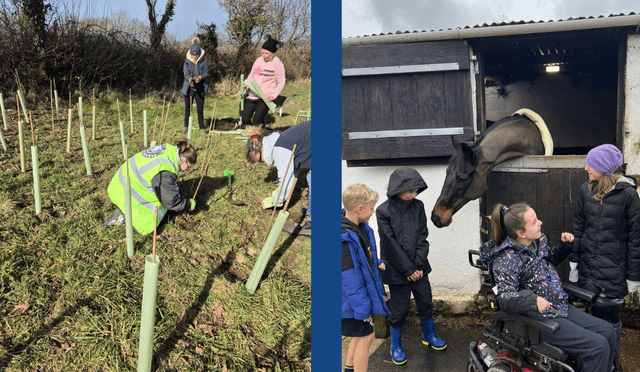Community Story: Redberth Croft CIC
"It gives us the breathing room to innovate and to involve our volunteers and beneficiaries in shaping the site’s development. Without it, small rural organisations like ours would be stuck firefighting, unable to make longer-term improvements or invest in community-led solutions."
Today, we publish our first story covering a recipient of a grant from National Grid’s Community Matters Fund 2025 (Future Skills) and where better to start than West Wales, where our Head of Communications Luke Upton chatted to Daisy Coleman from Redberth Croft CIC to learn more about the amazing impact they are making in their community.
Luke Upton (LU): Thank you for the time, Daisy, could you tell our readers more about the community you serve? And why your support is so important?
Daisy Coleman (DC): No problem! Of course, Redberth Croft CIC is based in a small, semi-rural village in Pembrokeshire with no local amenities, poor transport links, and a high level of rural isolation. We support people who are often overlooked by mainstream services—adults and young people with additional learning needs (ALN), mental health challenges, veterans, and those facing social exclusion. Our farm provides a safe, inclusive space where people can reconnect with nature, community, and purpose.

"This investment in people and infrastructure is helping us lay the foundation for a more inclusive, sustainable local economy in Pembrokeshire."
LU: Great, and what’s been your particular focus in recent years?
DC: Our focus has been on using the power of land-based activities—like horticulture, conservation, and animal-assisted interventions—to support wellbeing, life skills, and community inclusion. We’ve developed a model that blends therapeutic work with practical training, giving people the opportunity to grow in confidence, learn skills, and build peer relationships. Recently, we've also been building strategic partnerships to create wider access to green skills training and volunteer opportunities, particularly for those with protected characteristics and lived experience of disadvantage.
LU: You’ve just received funding from the Community Matters Fund from National Grid and Localgiving. Can you tell us some more about the project it will help fund and what it aims to deliver.
DC: We’re incredibly grateful to National Grid for this funding—it will support the delivery of our Growing Futures project, which is all about helping people with barriers to employment gain real, transferable skills through sustainable horticulture and enterprise. The funding will directly support our core operating costs and enable us to deliver training sessions, one-to-one mentoring, and hands-on volunteering opportunities as part of our Start-Up Incubator.
Through this programme, participants—many of whom are neurodiverse, veterans, or face social exclusion—will learn practical rural skills and business fundamentals that can help them move toward employment, further training, or even starting their own green micro-enterprises. This investment in people and infrastructure is helping us lay the foundation for a more inclusive, sustainable local economy in Pembrokeshire. So, a very big thank you to National Grid and Localgiving for their fantastic support.

LU: Brilliant, so how important is this kind of funding to your organisation?
DC: It’s critical. As a young CIC, we’re operating in a challenging funding landscape. This kind of support enables us to turn ideas into action and respond directly to what our community tells us they need. It gives us the breathing room to innovate and to involve our volunteers and beneficiaries in shaping the site’s development. Without it, small rural organisations like ours would be stuck firefighting, unable to make longer-term improvements or invest in community-led solutions.
LU: As we always like to ask, our interviewees, more money aside, what would help you most?
DC: Access to skilled volunteers, particularly in trades or land-based industries, would be a game-changer. We also need more strategic partnerships with organisations willing to share expertise, equipment, or provide mentoring and training routes for our participants. And finally, support with transport would make a massive difference—it’s often the single biggest barrier for people trying to access what we offer.
LU: And before we finish up, is there anything else you'd like to inform our readers about?
DC: We’re always looking to work with others who care about community, sustainability, and inclusion. Whether it’s volunteering, co-designing new projects, or helping us amplify rural voices that often go unheard, we welcome collaboration. This project isn’t just about conservation—it’s about creating a legacy where people and nature can thrive together.
LU: Fantastic, thanks Daisy. Keep up the amazing work!
If you think you can support Redberth Croft CIC, then contact the team here - redberthcroft@gmail.com
